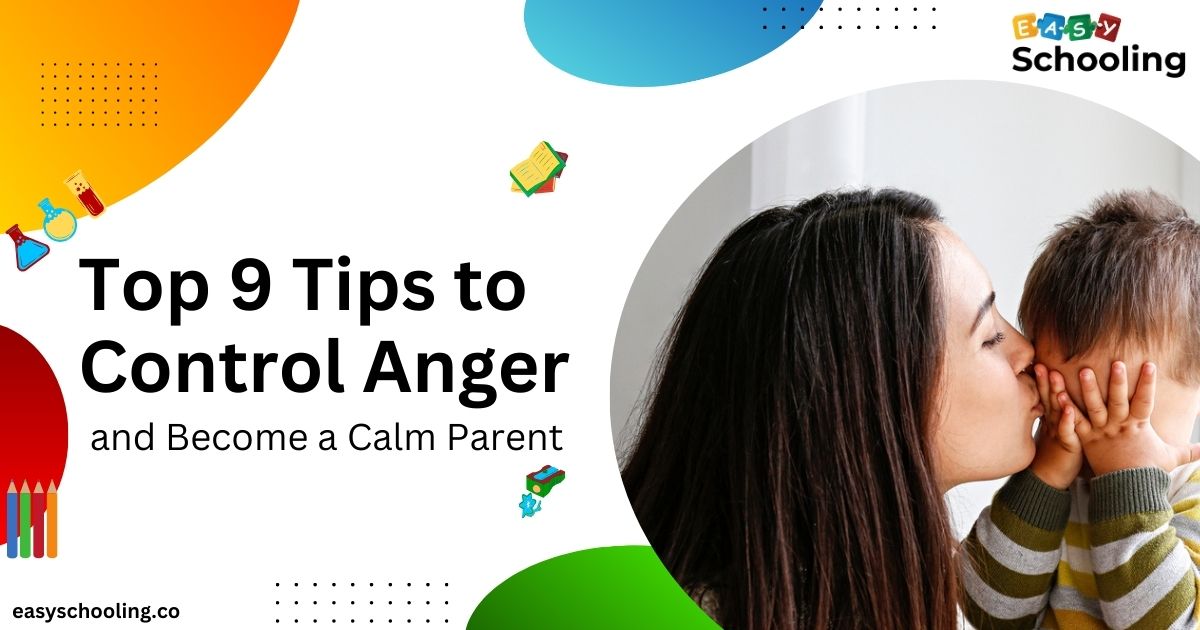Parenting, a rewarding yet challenging journey, often prompts various emotions, and managing anger is an essential aspect of nurturing healthy relationships with your children. Uncontrolled anger can disrupt the harmony of your household and impact your child’s emotional well-being. At EasySchooling, we understand the significance of maintaining composure while raising children. Here, we present invaluable parenting tips to control anger and foster a peaceful parenting environment.
Parenting Tips to Control Anger
Understanding the Root Causes of Anger
Before delving into effective anger management strategies, it’s crucial to identify the underlying triggers. Stress, exhaustion, unrealistic expectations, or unresolved emotions from your past can contribute to anger outbursts. Recognizing these triggers empowers you to respond consciously rather than react impulsively.
Practicing Mindfulness Techniques
Mindfulness serves as a powerful tool in anger management. It is one of the tips to control anger. Engaging in mindfulness exercises, such as deep breathing, meditation, or yoga, helps cultivate self-awareness and emotional regulation. These practices enable you to acknowledge anger without letting it overpower you, fostering a calm and composed mindset.
Establishing Effective Communication Channels
Open and honest communication acts as a cornerstone in defusing tense situations. You can encourage a safe space for your children to express their feelings without judgment. Active listening, empathy, and validating their emotions can defuse potential conflicts and minimize anger triggers.
Implementing Time-Out Strategies
When feeling overwhelmed by anger, taking a step back via a “time-out” strategy can be beneficial. One of these tips to control anger allows both you and your child to cool off and reflect on the situation separately. It prevents escalating tensions and promotes a more rational approach to conflict resolution.
Embracing Positive Reinforcement Techniques
Acknowledging and praising positive behavior reinforces a healthy parent-child relationship. Positive reinforcement encourages desirable conduct, reducing the likelihood of anger-inducing situations. Simple affirmations and rewards can significantly impact your child’s behavior and your response to their actions.
Prioritizing Self-Care Practices
Caring for yourself is fundamental in effective anger management. Prioritize self-care by allocating time for hobbies, exercise, adequate sleep, and nourishing nutrition. A rejuvenated mind and body equip you to handle challenging situations with a calmer disposition.
Seeking Support and Guidance
Don’t hesitate to seek assistance when needed. Joining parenting support groups, consulting with mental health professionals, or attending workshops on anger management equips you with valuable insights and coping mechanisms. Seeking support doesn’t signify weakness but showcases your dedication to improving your parenting skills.
Cultivating Flexibility and Patience
Parenting rarely adheres to a strict blueprint. Embrace flexibility and understand that mistakes are part of the learning curve. Cultivating patience with yourself and your child allows room for growth and development, fostering a harmonious parent-child relationship.
Modeling Healthy Behavior
As a parent, you serve as a role model for your child’s behavior. Demonstrating healthy anger management techniques showcases the importance of emotional regulation and conflict resolution. Your actions speak louder than words, shaping your child’s perception and response to anger.
Embracing Emotional Intelligence
This is one of the tips to control anger. Emotional intelligence plays a pivotal role in managing anger effectively. By understanding and regulating your emotions, you set a positive example for your children. Teaching them about emotional awareness and control fosters a nurturing environment where anger is addressed constructively.
Creating a Supportive Routine
Establishing a consistent and structured routine can significantly reduce anger triggers. Predictability provides a sense of security for both you and your child, minimizing stressful situations and potential conflicts. Implementing a daily routine that includes quality time, play, and relaxation contributes to a more harmonious household.
Implementing Conflict Resolution Strategies
Conflict is inevitable in any relationship, but how it’s managed matters. Teach your child healthy conflict-resolution skills by discussing problems calmly, listening attentively, and finding mutually beneficial solutions. Modeling these techniques cultivates a respectful and peaceful environment, reducing instances of anger flare-ups.
Utilizing Relaxation Techniques
When faced with rising anger, employing relaxation techniques can be immensely beneficial. Techniques like progressive muscle relaxation, visualization, or engaging in a calming activity divert your focus from the anger-inducing situation, allowing for a more composed response.
Setting Realistic Expectations
Unrealistic expectations can fuel anger and frustration. Understand that both you and your child are constantly learning and growing. Setting achievable goals and understanding developmental stages aids in managing expectations, fostering a more patient and understanding attitude.
Practicing Empathy and Compassion
Cultivating empathy towards your child’s feelings and experiences nurtures a deeper connection and minimizes anger. Empathy allows you to see situations from your child’s perspective, leading to more empathetic responses and reduced conflict.
Engaging in Physical Activity
Physical activity serves as an effective outlet for releasing pent-up anger and stress. Encourage physical play or exercise for both you and your child. Engaging in activities like jogging, playing sports, or dancing releases endorphins, promoting a more positive mood.
See More: Understanding ADHD: How Parents Can Offer Support
Monitoring Triggers and Patterns
This is one of the tips to control anger. Self-awareness regarding your anger triggers and patterns is essential in managing and preventing outbursts. Keep a journal to track situations that evoke anger and analyze patterns to proactively address them, thereby minimizing future conflicts.
Celebrating Progress and Efforts
Recognize and celebrate progress, no matter how small. Acknowledge your efforts in controlling anger and positively reinforcing your child’s attempts at managing their emotions. Celebrating achievements motivates continued growth and fosters a supportive environment.
By implementing these additional strategies alongside the previously mentioned tips, you’ll establish a nurturing environment that promotes anger control and fosters a calm and collected parenting style.
In conclusion, mastering anger control and becoming a calm parent is a continuous journey that requires dedication and practice. By implementing these expert parenting tips to control anger, you pave the way for a harmonious household, fostering a nurturing environment for your child’s emotional growth. Learn more from EasySchooling.co.
